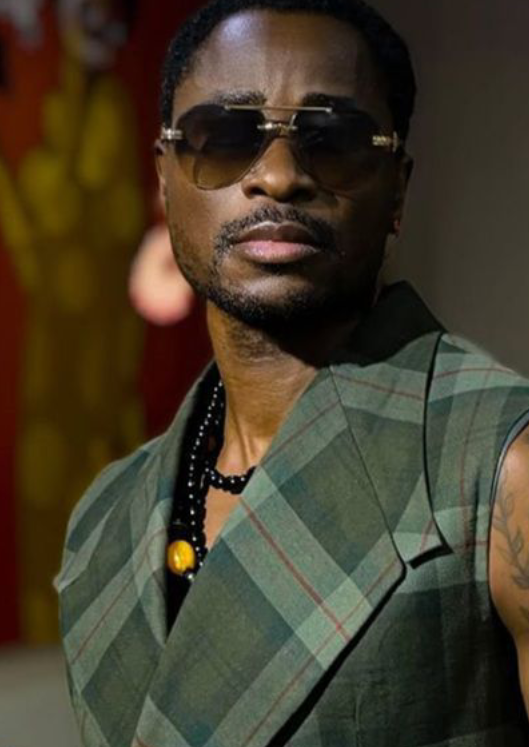
“You Okay?” – Bisi Alimi Slams Hypocrisy of Closeted Men Condemning Their Gay Relatives’ Relationships

Popular Nigerian LGBTQ+ rights activist, Bisi Alimi, has once again sparked heated conversations online after calling out the hypocrisy of men who secretly live double lives — those who identify as gay but choose to marry unsuspecting women, only to turn around and condemn others for embracing their sexuality openly.
In a post shared on his social media platform, Alimi expressed disbelief and frustration at what he described as a recurring hypocrisy within Nigerian society. His statement read: “Please make it make sense. You’re a gay man, married a woman who is unaware of your sexuality and have kids for you, but now your sister has brought a man home to marry — someone you know to be gay — and you are fighting against it, raining fire and brimstone, and saying the wedding will not happen. Excuse me? You okay?”
The post, which has since gone viral, immediately ignited a storm of reactions across social media platforms, with thousands weighing in on the complex realities of sexuality, family, and societal pressure in Nigeria. Bisi Alimi’s name quickly trended on X (formerly Twitter), with users divided between those who praised him for speaking the truth and others who accused him of stirring unnecessary controversy.
Alimi, who has long been a vocal advocate for LGBTQ+ rights and one of the first Nigerian public figures to openly come out as gay, is no stranger to controversy. His activism has often placed him at the center of heated cultural debates, especially in a country where same-sex relationships are criminalized and stigmatized. Yet his recent statement touched a deeper nerve — not just about sexuality but about the moral contradictions that often accompany silence and secrecy in deeply conservative societies.
For many, Alimi’s post echoed a familiar story. In Nigeria, where same-sex relationships can attract up to 14 years in prison under the Same-Sex Marriage (Prohibition) Act, countless gay men and women continue to live in fear, hiding their true identities. Many bow to family and societal pressure by entering heterosexual marriages — unions that often end in heartbreak and emotional trauma for all involved.
Alimi’s words, blunt and unapologetic, highlighted the moral inconsistency in a scenario where a man living a closeted life projects judgment on someone who has chosen to live freely and authentically. His message cut through the layers of religious posturing and cultural pretense that often mask the quiet suffering of many closeted Nigerians.
“Hypocrisy is our national religion,” one X user commented under Alimi’s post, while another wrote, “You can’t oppress someone for choosing honesty when your whole life is a lie.” Others, however, argued that Alimi’s tone was too confrontational and that not everyone who hides their sexuality does so out of choice but rather out of survival in a hostile environment.
Still, the post brought a much-needed discussion to the surface — one that questions how far individuals are willing to go to maintain appearances while suppressing their true selves. It also raised deeper questions about the ripple effects of forced marriages on women who unknowingly find themselves in relationships built on secrecy.
Several online commentators pointed out the emotional toll on such women, many of whom are left to wonder why their marriages lack intimacy or emotional connection. “The saddest part is the women who suffer,” one commenter wrote. “They are faithful, loving wives, but they never understand why their husbands are distant. It’s a tragedy that’s repeated again and again because society won’t allow people to be honest.”
Bisi Alimi’s call-out comes at a time when conversations around identity and acceptance are slowly gaining ground among young Nigerians. Despite strict anti-gay laws and cultural taboos, there is a growing online movement demanding empathy, inclusion, and honest conversations about sexuality and consent. However, those who openly identify as gay or lesbian in Nigeria still face intense backlash, discrimination, and even violence.
For Alimi, who came out publicly on national television in 2004 — a decision that led to death threats, public ostracism, and eventual exile — this is more than a social media rant. It is a fight against a system that forces people into lifelong deception. In interviews, he has often spoken about how internalized shame and societal pressure destroy lives and families. His recent post, while sharp, carries the weight of someone who has lived through the very realities he condemns.
Critics, however, continue to accuse him of being too harsh on those living in the closet. Some argue that many closeted individuals are victims themselves — forced to conform to survive in a system that gives them no safe options. “It’s not always black and white,” one social media user wrote. “Some people marry because they’re scared. Because being open could get them killed. Let’s not ignore that reality.”
But Alimi’s point, supporters insist, is not about condemning fear but about rejecting hypocrisy. The scenario he described — a closeted man fighting his sister’s freedom — represents, to many, a broader pattern in Nigerian society, where moral outrage often masks personal guilt. “We hide our sins while condemning others,” a fan of Alimi posted. “It’s the Nigerian way.”
The viral post has also reignited debates about the intersection of religion and sexuality. Many Nigerian families, driven by deeply rooted religious beliefs, see homosexuality as an abomination, often resorting to prayer camps, exorcisms, or forced marriages to “cure” it. Alimi’s comment, by exposing this contradiction, indirectly challenges the moral double standards of those who use religion as a weapon of suppression while living in secret.
For years, Bisi Alimi has used his platform to confront such contradictions head-on. Through his foundation and public speaking engagements, he continues to advocate for a Nigeria where people can live freely without fear or shame. While many still find his bluntness uncomfortable, few can deny the truth at the heart of his message: that honesty, however difficult, is better than living a lie that hurts others.
As the debate continues to rage, one thing remains clear — Alimi’s statement has touched on something raw and real in Nigerian society. It has forced many to reflect not only on their views about homosexuality but on the quiet, personal hypocrisies that sustain collective denial.
Perhaps the most haunting part of his post is the closing phrase — “Excuse me? You okay?” — a simple question that cuts deeper than it seems. It’s not just a sarcastic jab but a challenge to self-reflection. Are we okay as a society when lies are celebrated and truth is condemned? Are we okay when love becomes something to be hidden, while deceit is rewarded?
In a nation still grappling with its moral compass, Bisi Alimi’s words echo beyond the walls of social media. They demand honesty, empathy, and the courage to stop pretending — because maybe, just maybe, the real sickness isn’t love itself, but the hypocrisy that keeps it locked away.


